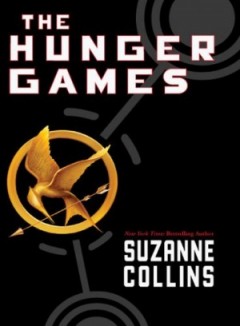I started the 11-hour Audible.com audiobook of The Hunger Games, by all-time bestselling Kindle author Suzanne Collins, in the evening. Eight hours later, I finally summoned one small spark of the courage of its heroine, 16-year-old black-market hunter-gatherer Katniss Everdeen, and touched a half-frozen, bloody, mud-encrusted finger to my iPhone’s STOP button even though three hours remained. As soon as I awoke a few hours later, I checked the condition of my burns and cuts and was surprised to find that they had healed. No, that wasn’t it; those things had only happened to characters in a book.
The Hunger Games film-release buzz intrigued me enough to dive into the book before visiting the theater. I had previously only heard superficial mentions of a dark, brutal story and did not become interested until some of the advance film reviews suggested that the story might actually convey significant and thoughtful content in an action package. It does.
This is a fresh addition to the list of classic dystopian dramatic critiques of the state that work by showing what the state does to society and human beings in a magnified, allegorical form. The author’s choice of a close first-person voice and sympathetic main character transform the central state’s artificial battle game show into a very human landscape in the context of a post-apocalyptic North America. The nature of zero-sum game-making is revealed through a specific set of living eyes.
The Hunger Games are staged annually as an ongoing punishment for a failed rebellion against the center decades earlier. The center wants the 12 peripheral districts, each also kept isolated from the others, to always remember their subservient status and the futility of resistance. Twenty-four “tributes” between the ages of 12 and 18, one male and one female from each of the districts are selected by a lottery called “the reaping” and travel by luxury express train to the glorious and wealthy “Capitol” to compete in a gladiatorial survival reality TV marathon that the entire nation watches like the Olympics.
Instead of winning on points or being voted off, contestants are to live off the land and kill each other any way they can in a struggle to be the last one alive as days of combat, evasion, and nature survival stretch out before the cameras. Only one can live, winning a year of bonus rations for their home district and personal survival, a generous lifetime income, and celebrity status. Those selected are trained, groomed, costumed, and interviewed before the games. Viewer betting is intense, and sponsors can, at great expense, send players they favor well-timed small gift aid items by precision micro-parachute drop during the games. This makes it helpful for players to make a good impression on potential sponsors before the games even begin, incentivizing them to participate in staged pre-game pageantry.
This Year’s Games
Katniss has been a part-time hunter and gatherer from early childhood. In a starving coal district, she became the sole provider for her unstable mother and younger sister after her father’s death in a mine explosion. She supports her family by recalling her father’s lessons and becoming an illegal hunter in the forest outside the dilapidated District-12 security fence. Officials avoid arresting or shooting her or Gale, her hunting partner, because the officials themselves enjoy buying wild game, vegetables, berries, and herbal products from them.
[continue reading…]
Help Promote Prometheus Unbound by Sharing this Post













